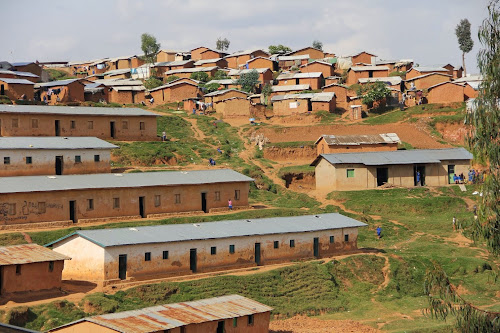I've seen a lot of poverty in my life having traveled to some of the poorest locations on earth for many years, so Gihembe Refugee Camp in Rwanda did not surprise me. The faces of the children, their still youthful joy and hunger mixed together in their eyes, stay with me in a growing collage of eyes and smiles and tears and pain that accumulate in my memory. But, it does not minimize the impact this has on my mind and heart and soul for appalling circumstances don't really mean much to most people until one looks into the face of another human being.

The smiles and joy don't appear very often in the faces of the teenagers and adults. Time seems to have caused a hopelessness that wipes the smile right off a face. Many families here in Gihembe have been waiting up to 20 years to hear if they're going to be resettled. These children? Most were born here, but no one chose to be here. Gihembe is the end of the road for those who had to flee persecution. And for far too many, it is a dead end.
Before setting out to the Gihembe Refugee Camp an hour outside of Kigali, we met with our hosts in Rwanda, UNHCR (United Nations High Commissioner for Refugees). We were briefed on the work of UNHCR in Central Africa, particularly in Rwanda.
Rwanda is only 1/4 to 1/3 the size of England with a population of over 12 million people. It currently hosts five refugee camps with a total population of more than 74,000 refugees. Ninety-nine percent are from DRC (Democratic Republic of Congo). The job of UNHCR, RSC, and the many other organizations that work together on behalf of those displaced by persecution and violence to get them resettled somewhere and somehow, is daunting, but each person involved express dogged determination to do just that. Even at the highest level, there is a commitment that far exceeds hope to care for these people.
Gihembe refugee camp was established in 1997 after the Mudende camp in western Rwanda was attacked twice resulting in hundreds of deaths. The refugees are from the DRC (Democratic Republic of Congo) and 99% are Mudende massacre survivors who had already fled their country to escape the torture and war they were experiencing in their towns and villages. (More on that later.) When I use words like massacre and torture, please take a moment to think about that. These men and women and their children have experienced and survived horrors that would turn your stomach. I'm talking about 14,000 people in Gihembe alone, a small refugee camp compared to most.
There isn't an adequate water supply to the camp, so although the people have soap, they can't wash. 200 people use one latrine and there is no electricity for the school classrooms or shelters. Food is in short supply and many children receive only one meal a day provided by the school-a nutritious porridge. Here we are walking by a 6th grade classroom where the teacher to student ratio is 1:50.
We finally meet with the refugees to hear their stories. The ESL (English as a Second Language) classroom was full as they wanted to hear about life in America. They knew we were from one of the resettlement agencies in the US and were eager to pepper us with questions about when, how, where, and when will they get to resettle. We could only stress that they continue to learn the language and attend cultural orientation classes. It was all we could offer. We had no idea about where in the process the individual cases were and we knew all too well that in actuality only a small percentage will be resettled.
What stunned me was the affection they had for Americans. (No matter how often you explain that America consists of Canada, U.S., Central America and South America, the United States is still referred to by people from other continents as "America.") They thought of us a generous, kind, and welcoming people. They know that the United States resettles more people than any other country in the world, but they don't know that those numbers have shrunk.
I really wish every politician, religious leader, and citizen had to answer to these fellow human beings sitting in a room like we did listening to such desperate, yet polite, pleas for information, for hope. Too many in the room had lost any hope. It was evident on their expressionless faces. What do you tell people who have had to flee a country they didn't want to leave? Who have now lost the land they had and continued violence makes it impossible to return? That they country that is hosting this refugee camp cannot take them in due to their own weak infrastructure? That other countries who have the means to take them find no moral obligation to either allow them in or, at the very least, fully fund a refugee program that is adequate?
No, we tell them that they must persevere. As if we have any understanding of the perseverance they have had to muster up for years. So, I ask the UNHCR workers how they handle this day after day, and they all more or less answer, if I can make a difference for even one, it is worth it.
I just think we should and could do better than that.






No comments:
Post a Comment